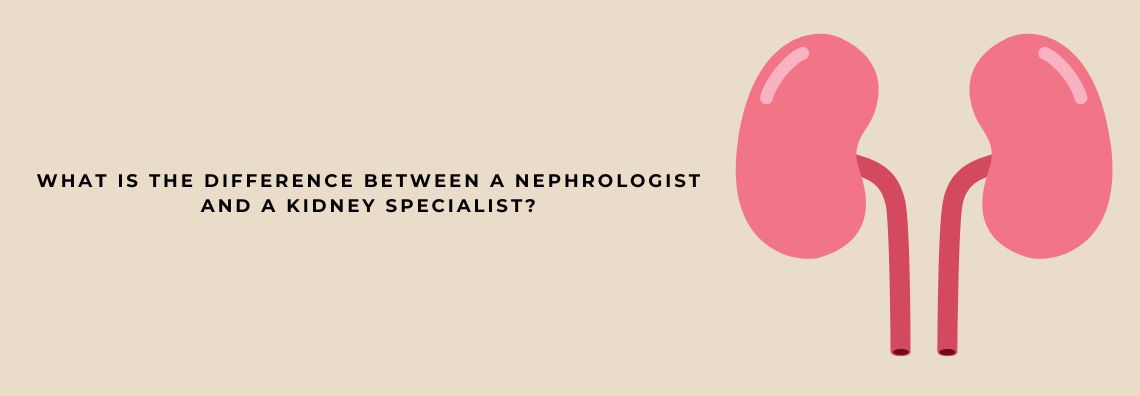
When it comes to kidney health, people often hear the terms nephrologist and kidney specialist used interchangeably. However, many wonder if there is any difference between the two. In this article, we will explore the roles, responsibilities, and differences between nephrologists and kidney specialists, helping you understand who to consult for specific kidney-related concerns.
Understanding Kidney Health and Its Importance
The kidneys play a crucial role in the body’s overall health. They filter waste and excess fluids from the blood, regulate electrolyte levels, produce hormones that control blood pressure, and contribute to red blood cell production. Any problem with the kidneys can lead to serious health complications, including chronic kidney disease (CKD), kidney infections, kidney stones, and kidney failure.
Since kidney diseases are often silent in their early stages, timely diagnosis and treatment are essential. That’s where kidney specialists and nephrologists come in.
What Is a Kidney Specialist?
A kidney specialist is a general term used to describe any medical professional who specializes in treating kidney-related conditions. This can include nephrologists, urologists, and other healthcare providers who deal with kidney diseases.
Some kidney specialists focus on medical treatment (like nephrologists), while others may focus on surgical solutions (like urologists). Therefore, the term “kidney specialist” can refer to a broad group of doctors who treat kidney disorders, depending on their medical training and area of expertise.
Types of Kidney Specialists
There are two main types of kidney specialists:
- Nephrologists – Experts in medical kidney care (non-surgical).
- Urologists – Surgeons who treat kidney-related disorders along with urinary tract issues.
Who Is a Nephrologist?
A nephrologist is a medical doctor who specializes in diagnosing and treating kidney diseases. Nephrologists receive advanced training in internal medicine and then further specialize in nephrology, which deals with medical (non-surgical) treatment of kidney conditions.
What Does a Nephrologist Do?
A nephrologist manages various kidney-related disorders, including:
- Chronic Kidney Disease (CKD) – A long-term condition where the kidneys gradually lose function.
- Kidney Failure – When the kidneys can no longer filter waste properly, requiring dialysis or transplantation.
- Glomerulonephritis – Inflammation of the kidney’s filtering units.
- Nephrotic Syndrome – A condition that leads to excessive protein loss in urine.
- Hypertension (High Blood Pressure) Related to Kidney Disease – Since kidneys regulate blood pressure, nephrologists often treat complex cases of hypertension.
- Electrolyte Imbalances – Conditions related to abnormal sodium, potassium, or calcium levels.
- Polycystic Kidney Disease (PKD) – A genetic disorder that leads to the formation of cysts in the kidneys.
- Acute Kidney Injury (AKI) – Sudden kidney failure due to infections, medications, or other factors.
- Dialysis Management – Nephrologists oversee patients undergoing hemodialysis or peritoneal dialysis.
- Kidney Transplantation – Nephrologists work closely with transplant surgeons to prepare and manage kidney transplant patients.
When Should You See a Nephrologist?
A person should visit a nephrologist if he/ she is facing these mentioned symptoms or health issues:-
- A persistently high blood pressure that is difficult to control even with rest and medicines.
- Compromised kidney function and issues like Chronic Kidney Disease (CKD).
- Noticing blood in urine or the urine test shows high protein content.
- Electrolytes test shows low amount of essential electrolytes like sodium or high content of potassium.
- Frequently occurring kidney stones that need long- term management.
- Frequently occurring UTIs (Urinary Tract Infections) and diabetes related kidney problems.
Nephrologist vs. Kidney Specialist: What’s the Difference?
Definition
Nephrologist
Nephrologists are doctors that have specialization and residency training in treating diseases and health conditions related to the kidney.
Kidney Specialist
Kidney specialist is a broad term to include all the nephrologists, urologists and the doctors associated with treating problems related to the kidney.
Medical Vs. Surgical
Nephrologist
A nephrologist majorly focuses on non- surgical treatments for improving kidney health like medications, dialysis, transplant management, etc.
Kidney Specialist
This includes all the surgical and non- surgical treatments that are done for a better kidney health and function of the patients.
Common Conditions Treated
Nephrologist
Nephrologists deal with kidney related problems like Chronic kidney disease, kidney failure, electrolyte disorders, nephrotic syndrome, dialysis care, and transplant management.
Kidney Specialist
Kidney specialists deal with kidney related problems like kidney stones, kidney cancer, kidney infections, or urinary tract problems.
Education and Training
Nephrologist
Nephrologists have MD or DO in internal medicine which is further followed by a nephrology fellowship.
Kidney Specialist
Kidney specialists have different- different specialization as it includes many types of doctors like nephrologists, urologists, etc.
Do You Need a Nephrologist Chermside or Another Kidney Specialist?
Choosing the right specialist depends on your condition.
- If you have chronic kidney disease, kidney failure, high blood pressure, or need dialysis – consult a nephrologist in Chermside.
- If you have kidney stones, blockages, or need kidney surgery – consult a urologist (who is also a kidney specialist).
- If you have a urinary tract infection (UTI) or bladder-related issues – consult a general physician or urologist first.